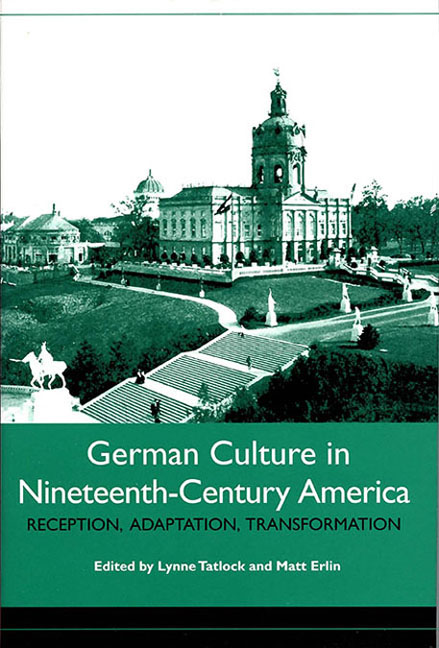Book contents
- Frontmatter
- Contents
- List of Illustrations
- Acknowledgments
- Introduction
- 1 Cultural Politics at the Turn of the Twentieth Century
- 2 In Pursuit of Intellectual Culture
- 3 Translation American Style
- 4 Immigration and Naturalization Acts
- New Country, Old Secrets: Heinrich Börnstein's Die Geheimnisse von St. Louis (1851)
- The Americanization of Franz Lieber and the Encyclopedia Americana
- From Domestic Farce to Abolitionist Satire: Reinhold Solger's Reframing of the Union (1860)
- Contributors
- Index
From Domestic Farce to Abolitionist Satire: Reinhold Solger's Reframing of the Union (1860)
from 4 - Immigration and Naturalization Acts
Published online by Cambridge University Press: 13 April 2017
- Frontmatter
- Contents
- List of Illustrations
- Acknowledgments
- Introduction
- 1 Cultural Politics at the Turn of the Twentieth Century
- 2 In Pursuit of Intellectual Culture
- 3 Translation American Style
- 4 Immigration and Naturalization Acts
- New Country, Old Secrets: Heinrich Börnstein's Die Geheimnisse von St. Louis (1851)
- The Americanization of Franz Lieber and the Encyclopedia Americana
- From Domestic Farce to Abolitionist Satire: Reinhold Solger's Reframing of the Union (1860)
- Contributors
- Index
Summary
The Hon. Anodyne Humdrum; or, The Union Must and Shall be Preserved (1860), written by forty-eighter and journalist Reinhold Solger (1817–66) seven years after he emigrated to the United States, offers scholars an opportunity to examine the process by which a German-American writer took up his own German cultural material — in this case Der Reichstagsprofessor: Posse in einem Akt (The Professor in the Parliament: Farce in One Act, 1850) — and transferred it to a different national context.1 Solger shifted the setting of his play from the German territories to the United States, the time from 1850 to 1860, the political issue from the failed revolution of 1848–1849 to the institution of slavery, and the language from German to English. This essay will explore how this transformation changed the nature and intent of the adapted drama, despite the similarities it bears to the original play in terms of plot and humor. In reframing the ideas and values depicted in his German comedy, the immigrant writer created a new literary satire that not only commented on but also sought to inform and influence political developments in the United States. This essay concludes with an annotated reproduction of the final scene of Solger's English-language play. With its emphasis on politics rather than the requisite happy ending, this scene best reveals the significant changes Solger made in reimagining his original drama.
In March 1848, when revolutionaries throughout the German states demanded reforms such as liberal governments, an end to censorship, and the abolishment of feudal privileges, the parliament of Baden made numerous political concessions. Radicals in this southwestern region remained dissatisfied, however, and continued their revolutionary activities; in June 1849 they convened a state assembly and charged it with drafting a constitution. The assembly's agenda quickly changed when Prussian troops marched into the Palatinate, a neighbor and ally of Baden, on 12 June; delegates appointed Ludwig Mieroslawski (1814–1878), a Polish general who had led his country's unsuccessful uprising against the Russians in 1830, as commander of Baden's revolutionary army. Solger, serving as the general's translator and adjutant, participated in the army's ill-fated revolt against Prussian troops at Waghäusel later that month.
- Type
- Chapter
- Information
- German Culture in Nineteenth-Century AmericaReception, Adaptation, Transformation, pp. 289 - 316Publisher: Boydell & BrewerPrint publication year: 2005

